| Listing 1 - 9 of 9 |
Sort by
|

ISBN: 3050007451 3050066210 9783050007458 Year: 1991 Volume: V 1,1 Publisher: Berlin Akademie Verl.
Abstract | Keywords | Export | Availability | Bookmark
 Loading...
Loading...Choose an application
- Reference Manager
- EndNote
- RefWorks (Direct export to RefWorks)
Galen --- Medicine, Greek and Roman --- Medicine --- De optimo docendi genere --- Exhortatio ad medicinam (Protrepticus) --- Education --- Education, Greek. --- Philosophy --- Ancient Greek education --- Greek education --- Galen - De optimo docendi genere --- Galen - Exhortatio ad medicinam (Protrepticus) --- Medicine - Early works to 1800
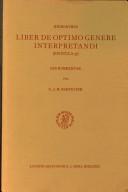
ISBN: 9004060855 9004327797 9789004060852 Year: 1980 Volume: 61 Publisher: Lugduni Batavorum Brill
Abstract | Keywords | Export | Availability | Bookmark
 Loading...
Loading...Choose an application
- Reference Manager
- EndNote
- RefWorks (Direct export to RefWorks)
Jerome --- Translating and interpreting --- Traduction et interprétation --- Early works to 1800 --- Ouvrages avant 1800 --- Jerome, --- Interpretation and translation --- Interpreting and translating --- Language and languages --- Literature --- Translation and interpretation --- Translators --- Translating --- Jerome Saint --- Traduction et interprétation --- Translating and interpreting. --- Liber de optimo genere interpretandi (Jerome, Saint) --- De optimo genere interpretandi (Jerome, Saint) --- Epistula 57 (Jerome, Saint) --- Jerome, - Saint, - -419 or 420 - Liber de optimo genere interpretandi
Book
ISBN: 9788376760100 8376760106 Year: 2009 Publisher: Kraków: Polska akademia umiejętności,
Abstract | Keywords | Export | Availability | Bookmark
 Loading...
Loading...Choose an application
- Reference Manager
- EndNote
- RefWorks (Direct export to RefWorks)
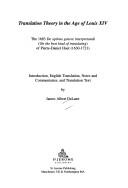
ISBN: 190065055X 1315759500 1317639375 9786612490316 1905763859 1282490311 1317639367 9781900650557 9781317639367 9781317639374 9781317639350 1317639359 Year: 2002 Publisher: Manchester, UK ; Northampton MA : St. Jerome Pub.,
Abstract | Keywords | Export | Availability | Bookmark
 Loading...
Loading...Choose an application
- Reference Manager
- EndNote
- RefWorks (Direct export to RefWorks)
Preeminent in a relatively rare category of separate early modern treatises on translation, the 1683 De optimo genere interpretandi by the polymath cleric Pierre-Daniel Huet (1630-1721) offers a concise introduction to its nature, history, theory, process and practice. Written in the form of a Ciceronian dialogue, On the best kind of translating not only represents Huet's acute and witty defence of the often disparaged literal or word for word model, but also provides illuminating glimpses into the critical and interpretive methods of his age. A guiding premise of this first modern edition and
Translating and interpreting --- Huet, Pierre-Daniel, --- Translating and interpreting. --- #KVHA:Vertaaltheorie --- Interpretation and translation --- Interpreting and translating --- Language and languages --- Literature --- Translation and interpretation --- Translating --- Translators --- Huet, Pierre-Daniel, - 1630-1721. - De optimo genere interpretandi
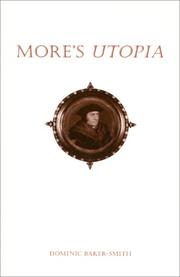
ISBN: 9786611995966 1281995967 1442677392 9781442677395 0802083765 9780802083760 Year: 2000 Publisher: Toronto
Abstract | Keywords | Export | Availability | Bookmark
 Loading...
Loading...Choose an application
- Reference Manager
- EndNote
- RefWorks (Direct export to RefWorks)
"Utopia has a strong claim to be the most misunderstood book ever written: its flame has been hijacked by countless idealistic schemes having little in common with More's own assessment of social possibilities. For although it contributes to a line of argument that can be traced from Plato to Marx, Utopia is first and foremost a literary work that appeals to the imagination and seeks to question us rather than to proffer answers." "This study prepares the reader for these challenges, placing the work in the context of early sixteenth-century Europe and the intellectual preoccupations of More's own humanist circle, and clarifying those sources in classical and Christian political thought that provoked his writing." "Utopia is presented as a reflection on political idealism, one that has lost none of its relevance in an age that has witnessed the collapse of Marxist aspirations to social control. Dominic Baker-Smith also surveys the varied critical reception accorded to Utopia over the last four centuries, providing a look at Utopia's role in cultural history."--Jacket
LITERARY CRITICISM / European / General. --- More, Thomas, --- 873.4 MORE, THOMAS --- 873.4 MORE, THOMAS Humanistisch Latijnse literatuur--MORE, THOMAS --- Humanistisch Latijnse literatuur--MORE, THOMAS --- Utopia (More, Thomas, Saint) --- De optimo reipublicae statu, deque nova insula Utopia, libri II (More, Thomas, Saint) --- Thomae Mori Utopia (More, Thomas, Saint) --- Utopia (More, Thomas, Sir, Saint) --- English literature --- History and criticism.
Book
ISBN: 1487534485 1487534493 9781487534486 9781487506599 1487506597 Year: 2020 Publisher: Toronto
Abstract | Keywords | Export | Availability | Bookmark
 Loading...
Loading...Choose an application
- Reference Manager
- EndNote
- RefWorks (Direct export to RefWorks)
"This unique study considers the influences of Stoic critics on the evolution of Thomas More's thought. The author argues that More's engaement with Erasmus's work radicalized his understanding of Christianity and shaped the writing of Utopia."--
Learning and scholarship. --- More, Thomas, --- Erudition --- Scholarship --- Civilization --- Intellectual life --- Education --- Research --- Scholars --- More, Thomas --- Thomas More --- Moro, Tommaso --- Morus, Thomas --- Morus, T. --- More, T. --- Moro, Tomás --- Moor, Thomas, --- Moore, Thomas, --- Mor, Tomas, --- More, Tomás, --- Moro, Thomaz, --- Moro, Tomás, --- Moro, Tommaso, --- Morus, Tamás, --- Morus, Thomas, --- Morus, Tomasz, --- מורוס, תומאס, --- Моръ, Томасъ, --- Morʺ, Tomasʺ, --- Christianity. --- Cicero. --- Desiderius Erasmus. --- Enchiridion. --- Lucian. --- Renaissance. --- Seneca. --- Stoicism. --- The Praise of Folly. --- Thomas More. --- Utopia. --- historyof literature. --- intellectual history. --- philosophy. --- theology. --- Learning and scholarship --- Utopia (More, Thomas, Saint) --- De optimo reipublicae statu, deque nova insula Utopia, libri II (More, Thomas, Saint) --- Thomae Mori Utopia (More, Thomas, Saint) --- Utopia (More, Thomas, Sir, Saint)
Book
ISBN: 9781584235538 Year: 2014 Publisher: Berkeley, Calif. Gingko Press
Abstract | Keywords | Export | Availability | Bookmark
 Loading...
Loading...Choose an application
- Reference Manager
- EndNote
- RefWorks (Direct export to RefWorks)
Art --- art [discipline] --- street art --- mural painting [image-making] --- kunst in de openbare ruimte --- graffiti [casual notations] --- Gaia --- Stain, Chris --- Walker, Nick --- Shiro --- Toofly --- Iurato, Joe --- Mizrachi, Alice --- Dain --- OCMC --- Lorraine, Lillian --- Astrodub --- King, Russell --- Elle Deadsex --- Dare, Adam --- Fumero --- Army of One --- ASVP --- Ballistic, Jilly --- Enzo and Nio --- Miyok --- Gilf! --- Icy and Sot --- Tripel --- Hellbent --- EKG --- Optimo Primo --- Roycer --- Indie184 --- Cope2 --- Free5 --- Cern --- Maldonado, Sofia --- Phetus88 --- Bishop203 --- Never Satisfied --- ChrisRWK --- VengRWK --- The Yok --- Sheryo --- Kram --- Elsol25 --- QRST --- ND'A --- OverUnder --- LunarNewYear --- bunny M --- New York City --- New York City [New York]
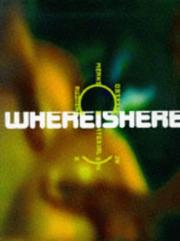
ISBN: 1856691411 Year: 1998 Publisher: London Laurence King
Abstract | Keywords | Export | Availability | Bookmark
 Loading...
Loading...Choose an application
- Reference Manager
- EndNote
- RefWorks (Direct export to RefWorks)
2000 --- -754.29 --- Blackwell, Lewis --- grafische vormgeving --- grafische vormgeving, verzamel --- Lewis Blackwell, P. Scott Makela & Laurie Haycock Makela ; Paula Carson ass. ed. --- computergrafiek --- computerdesign --- Clarke Libby --- Cashdollar Jeff --- Labs Greimanski --- Sagmeister Stefan --- Cardia Gringo --- Tylevich Alexei --- Phillips Ian --- Mau Bruce --- Barnett Derek --- Sigismondi Floria --- Disciulio Pierre --- Surface --- Kepenek Ali --- Vormwald Gerhard --- Weffenback Henryk --- Czako Zsolt --- Krism --- Schwartz Nicola --- Bobrov Dekel --- Sugiyama Hiro --- Homma Takashi --- Sakaki Kazuya --- Nakamura Norio --- Matsumoto Gento --- Oki Keisuke --- Omori Katsumi --- Orisaki Makoto --- Tanida Ichiro --- Tanaka Noriyuki --- Tetsuya Tamano --- Yoshida Yasuko --- Fakir --- Peon Ignacio --- Barriga Monica Peon Diaz --- Kramer Kessels --- Thijssen André --- Bodin Halvor --- Watz Marius --- Szyhalski Piotr --- Orange Juice Design --- Keller Pierre --- Optimo --- Burrill Anthony --- Crow David --- Farrow Design --- Higgins Nick --- MeCompany --- Cabry Brigio --- Mulder Matthew --- Foushee Danielle --- Corbitt Warren --- Denari Neil M. --- Bartlett Brad --- Hill Peter --- Funny Garbage --- Murakishi Steve --- Plansker Jeffery --- Miller J. Abbott --- Reverb --- Thirst --- Wild Lorraine --- Sakaki Kazuy --- grafische- en reclamevormgeving --- grafiek --- internet --- grafisch design --- grafisch ontwerp --- computers --- nieuwe media --- webdesign --- Fuel --- 766.036 --- Graphic arts --- graphic design
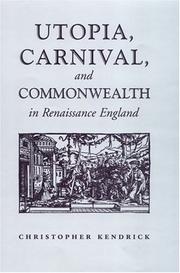
ISBN: 128199250X 9786611992507 144268299X 9781442682993 9781281992505 0802089364 9780802089366 Year: 2004 Publisher: Toronto University of Toronto Press
Abstract | Keywords | Export | Availability | Bookmark
 Loading...
Loading...Choose an application
- Reference Manager
- EndNote
- RefWorks (Direct export to RefWorks)
With the emergence of utopia as a cultural genre in the sixteenth century, a dual understanding of alternative societies, as either political or literary, took shape. In Utopia, Carnival, and Commonwealth in Renaissance England, Christopher Kendrick argues that the chief cultural-discursive conditions of this development are to be found in the practice of carnivalesque satire and in the attempt to construct a valid commonwealth ideology. Meanwhile, the enabling social-political condition of the new utopian writing is the existence of a social class of smallholders whose unevenly developed character prevents it from attaining political power equivalent to its social weight. In a detailed reading of Thomas More's Utopia, Kendrick argues that the uncanny dislocations, the incongruities and blank spots often remarked upon in Book II's description of Utopian society, amount to a way of discovering uneven development, and that the appeal of Utopian communism stems from its answering the desire of the smallholding class (in which are to be numbered European humanists) for unity and power. Subsequent chapters on Rabelais, Nashe, Marlowe, Bacon, Shakespeare, and others show how the utopian form engages with its two chief discursive preconditions, carnival and commonwealth ideologies, while reflecting the history of uneven development and the smallholding class. Utopia, Carnival, and Commonwealth in Renaissance England makes a novel case for the social and cultural significance of Renaissance utopian writing, and of the modern utopia in general.
English literature --- Utopias in literature. --- Politics and literature --- Satire, English --- Imaginary societies in literature. --- Carnival in literature. --- Renaissance --- Utopian literature --- History and criticism. --- History --- More, Thomas, --- Moor, Thomas, --- Moore, Thomas, --- Mor, Tomas, --- More, Tomás, --- Moro, Thomaz, --- Moro, Tomás, --- Moro, Tommaso, --- Morus, Tamás, --- Morus, Thomas, --- Morus, Tomasz, --- מורוס, תומאס, --- Моръ, Томасъ, --- Morʺ, Tomasʺ, --- Influence. --- Carnival in literature --- Imaginary societies in literature --- Utopias in literature --- 820 "15/16" --- 820 "15/16" Engelse literatuur--?"15/16" --- Engelse literatuur--?"15/16" --- History and criticism --- More, Thomas --- Thomas More --- Moro, Tommaso --- Morus, Thomas --- Morus, T. --- More, T. --- Moro, Tomás --- Influence --- Early modern, 1500-1700 --- Great Britain --- 16th century --- 17th century --- Satire [English ] --- England --- Utopia (More, Thomas, Saint) --- Englisch. --- Great Britain. --- England. --- De optimo reipublicae statu, deque nova insula Utopia, libri II (More, Thomas, Saint) --- Thomae Mori Utopia (More, Thomas, Saint) --- Utopia (More, Thomas, Sir, Saint) --- Anglia --- Angliyah --- Briṭanyah --- England and Wales --- Förenade kungariket --- Grã-Bretanha --- Grande-Bretagne --- Grossbritannien --- Igirisu --- Iso-Britannia --- Marea Britanie --- Nagy-Britannia --- Prydain Fawr --- Royaume-Uni --- Saharātchaʻānāčhak --- Storbritannien --- United Kingdom --- United Kingdom of Great Britain and Ireland --- United Kingdom of Great Britain and Northern Ireland --- Velikobritanii͡ --- Wielka Brytania --- Yhdistynyt kuningaskunta --- Northern Ireland --- Scotland --- Wales --- Angleterre --- Anglii͡ --- Anglija --- Engeland --- Inghilterra --- Inglaterra
| Listing 1 - 9 of 9 |
Sort by
|

 Search
Search Feedback
Feedback About UniCat
About UniCat  Help
Help News
News